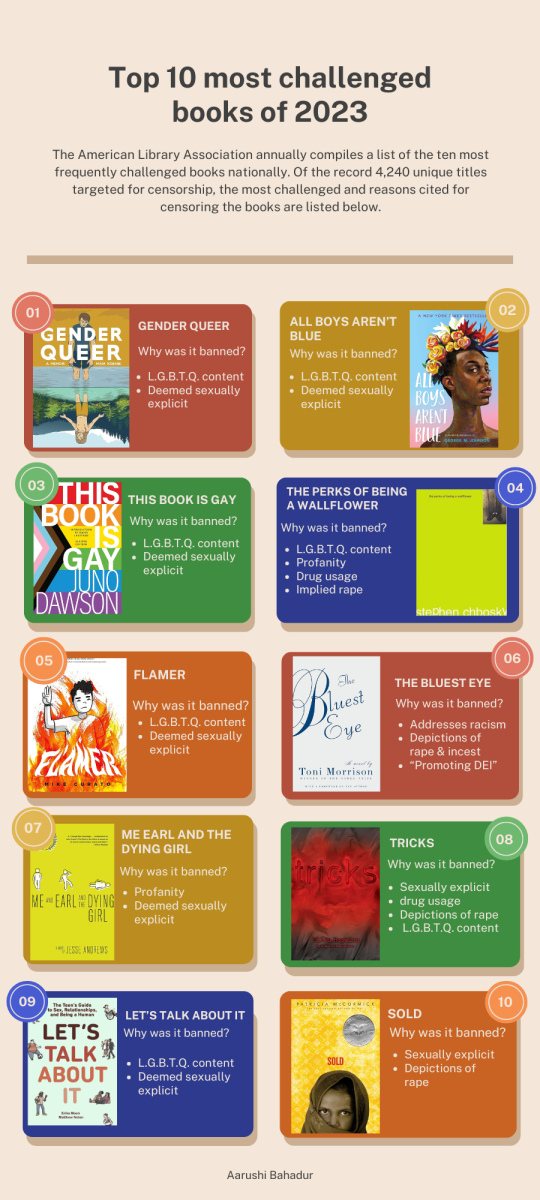Banned Books Week was launched in 1982 by the American Library Association (ALA) and is supported by PEN America, the Authors Guild, the National Book Foundation, and more than a dozen other organizations. The event is typically held in the last week of September and falls from Sept 22-28 this year.
PEN America, a nonprofit dedicated to protecting the freedom of expression, defines book bans as occurring when books selected by educators are overridden by school boards, administrators or politicians on the basis of the book’s content. The definition includes temporarily removed books. The ALA’s Office for Intellectual Freedom documented 1,247 demands to censor library books in 2023. 414 challenges were issued over the first eight months of 2024, with 1,128 different titles criticized. The ALA does not track how many titles have been withdrawn.
Librarian Cat Mullen has led Banned Books Week initiatives at every library she’s worked at, including making displays. This year, she aims to increase visibility.
“Previously, we’ve just had a section in the middle like the middle school area. But now we have two different displays, one with books that are geared towards Upper School students and adults. There’s just been this huge increase [in challenges and bans] in the last couple years, so I think it’s more important than ever to have more displays and make sure people are seeing that this can happen,” said Mullen.
Mullen and library assistant Tina Tsui selected the books on the displays by going through various lists of the 100 most challenged books in libraries across the country. They include the top 10 most frequently banned books from the previous year to make sure students see books that they’re already familiar with or may have previously read as part of the school curriculum. This year, they have expanded their reach.
“We went a little bit beyond that list to look at other books that have been banned or challenged in school libraries, just because we think those are going to be relevant to students as well. And then we pull what we have from the collection, and we put them on a book cart, and then surprisingly – actually, happily – a lot of them are checked out,” Mullen said.
Banned books frequently contain marginalized and nontraditional narratives or ideas that students can explore. Books written by or regarding the experience of LGBTQ+ people and people of color made up 47% of the books targeted by censorship.
“I think that books contain a lot of important information on different people’s experiences and culture, and they’re really a way that allows us to connect to people from across the entirety of the world. And so when you ban books, you kind of remove that knowledge and those pathways for people to gain empathy,” said Book Club Co-President Raven Glaser.

Glaser is currently reading Persepolis, a book that has been banned for its portrayal of sex and its depiction of the Iranian Revolution, which they checked out from the school library. The book has strengthened Glaser’s conviction of the value of reading marginalized and frequently banned stories.
“Banned books are frequently thought-provoking and meant to have discussion. It’s not surprising, but it is disappointing that people are trying to take away these books, especially as we have freedom of speech being…a principle that people care a lot about this country,” Glaser said.
Over the past school year, book bans have drastically increased. According to PEN America, 10,000 books were removed, at least temporarily, from public schools in the 2023-24 school year – almost three times as many removals as during the school year before. About 8,000 of those bans came just from Florida and Iowa, where new state laws led to books being removed from shelves en masse.
“I hope that libraries continue to highlight banned books week, to celebrate it in whatever way they’re able to in their community, whether that means making displays, buying those books, having book clubs, or doing programs around it,” said Mullen.
The banned books display will be in the library through next week.